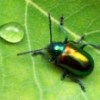One of the most important collections of South American plants is being shut down. The Utrecht Herbarium in the Netherlands houses nearly 1 million specimens and 10,000 types. When the museum closes we will lose a wealth of knowledge about the flora of a diverse and endangered part of the world.
Read More and Sign the Petition.
Why does this closure bother me?
Public support for biological research is the reason why that field guide on your shelf costs $15.00, instead of the $100 or so you'd be paying if you had to foot the bill for all the research that book is based upon. Our knowledge of the natural world comes in large part from government subsidies such as that supporting the Utrecht Herbarium. There are plenty of other benefits to maintaining natural history collections as well, including giving us abilities to identify and track medical and agriculture pests, to conduct more accurate forensic investigations, and to monitor long-term changes in the landscape.
Speaking personally, my income from photography absolutely depends on having correctly identified insects. That knowledge is directly tied to taxpayer-supported natural history collections. My identifications either come directly from collections (for instance, I put a name on this Apatides beetle by comparing the beetle to specimens in the natural history collection at the University of Arizona), or indirectly through the use of taxonomic keys and guides that are based on collections. This public knowledge creates private profit. I pay taxes back to the government. And through the compounded actions of many thousands of businesses like mine that make use of public biodiversity knowledge, the whole system pays for itself and makes everyone better off. That's why I find it so shortsighted every time another collection is closed and more taxonomic experts are laid off.
- Log in to post comments

that's horrible, I signed the petition. Honestly this is one of the few blogs I read regularly (besides mine of course),.. always great photos and great information. It's like a little piece of National Geographic or something..
I signed too. ;)
Thanks guys!